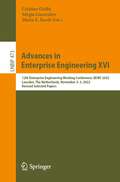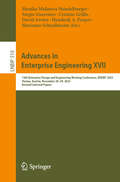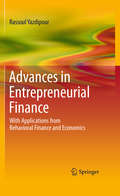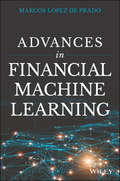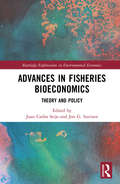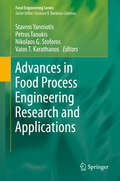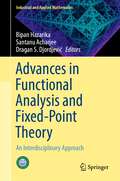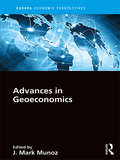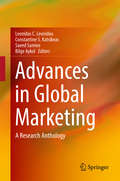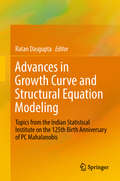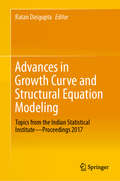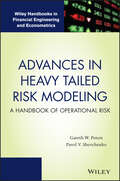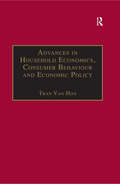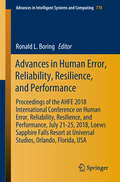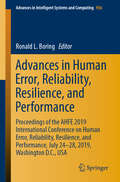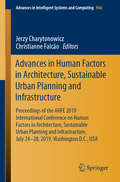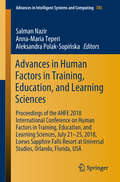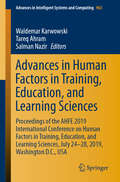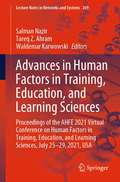- Table View
- List View
Advances in Enterprise Engineering XVI: 12th Enterprise Engineering Working Conference, EEWC 2022, Leusden, The Netherlands, November 2–3, 2022, Revised Selected Papers (Lecture Notes in Business Information Processing #473)
by Sérgio Guerreiro Cristine Griffo Maria E. IacobThis book constitutes the refereed proceedings of the 12th Enterprise Engineering Working Conference on Advances in Enterprise Engineering XVI, EEWC 2022, held in Leusden, The Netherlands, November 2–3, 2022. EEWC aims at addressing the challenges that modern and complex enterprises are facing in a rapidly changing world. The participants of the working conference share a belief that dealing with these challenges requires rigorous and scientific solutions, focusing on the design and engineering of enterprises. The goal of EEWC is to stimulate interaction between the different stakeholders, scientists as well as practitioners, interested in making Enterprise Engineering a reality. The 4 full papers and 2 short papers included in this book were carefully reviewed and selected from 13 submissions. In addition, there are 2 invited papers from keynote presentations. They were organized in topical sections as follows: Invited Papers from Keynote Presentations and Presented Papers.
Advances in Enterprise Engineering XVII: 13th Enterprise Design and Engineering Working Conference, EDEWC 2023, Vienna, Austria, November 28–29, 2023, Revised Selected Papers (Lecture Notes in Business Information Processing #510)
by David Aveiro Sérgio Guerreiro Henderik A. Proper Cristine Griffo Monika Malinova Mandelburger Marianne SchnellmannThis book constitutes the refereed proceedings of the 13th Enterprise Design and Engineering Working Conference on Advances in Enterprise Engineering XVII, EDEWC 2023, held in Vienna, Austria, during November 27–28, 2023. Enterprise design and engineering aims to take an integrative and engineering-oriented perspective to enterprise development management. As such, it considers enterprises as purposefully designed systems where all relevant aspects should be designed in coherence. The new scope of EDEWC reflects the rapid increase in digitization of enterprises in the last decade. This has resulted in a substantial change in the nature and structure of enterprises, which was the main focus of EDEWC 2023. The 5 full papers and 2 short papers included in this book were carefully reviewed and selected from 15 submissions.
Advances in Entrepreneurial Finance: With Applications from Behavioral Finance and Economics
by Rassoul YazdipourAdvances in Entrepreneurial Finance brings together contributions from researchers from the fields of entrepreneurship, behavioral finance, psychology, and neuroscience to shed new light on the dynamics of decision making and risk taking by entrepreneurs and venture capitalists (VCs). Every new venture requires access to capital at competitive interest rates, and much has been written on general entrepreneurship by management scholars and financial contracting by financial economists using traditional finance theory with all its highly restrictive assumptions regarding decision makers' cognitive capabilities and behavior. But recent developments in behavioral finance can now be applied to understand how entrepreneurs and VCs perceive risk and uncertainty and how they decide and act accordingly. Showcasing the latest research, this volume demonstrates that findings from the behavioral and neuroscience arenas can and do explain decision making by entrepreneurs and venture investors in the real world. Consequently, such findings have practical implications not only for entrepreneurs, venture capitalists, and their advisors, but also all government agencies and NGOs that want to support product and technological innovation, capital formation, job creation, and economic development.
Advances in Exercise and Health for People With Mobility Limitations
by David HollarThe purpose of this book is to provide public health, disability, and rehabilitation professionals and practitioners evidence-based science with respect to health disparities faced by people with disabilities, especially people with mobility limitations; alternative methods of rehabilitation and exercise science for this population; assistive device technology; and, improved access to health care, employment, and social participation.According to the National Institute on Disability, Independent Living, and Rehabilitation Research (NIDILRR), approximately 57 million Americans live with a disability. Disability severity and types vary considerably, such that each individual with a disability faces unique physical, social, and environmental barriers in order to enjoy quality of life and full participation in society. A large research literature shows that people with disabilities face substantial employment and health disparities compared to people without disabilities. People with mobility limitations often experience secondary conditions to compound their primary disability. Hollar (2013) and Hollar and Lewis (2015) showed that people with mobility limitations were significantly more likely to experience obesity and lack of access to physical exercise. Other studies have shown that access to proper physical examination facilities and equipment remain a substantial barrier in many clinics and hospitals despite the enactment of the Americans with Disabilities Act 25 years ago. Research on alternative exercise programs and new assistive device technologies offers promise to improve physical functioning and exercise for people with mobility limitations. Furthermore, increased focus on biopsychosocial over traditional medical models for disability will help policymakers and the public to recognize the complex, contextual issues (e.g., personal, social, environmental) that affect the lives of people with disabilities.Readership includes public health practitioners and educators, disability and rehabilitation researchers, clinicians and sports medicine practitioners, and disability advocates. There have been general handbooks on disability, but advances in technology and alternative exercise programs, as well as novel disability health programs, are dispersed in the research literature. This book will help to highlight these programs for health policy experts, especially given the high health and social disparities experienced by this population.
Advances in Financial Machine Learning
by Marcos Lopez de PradoMachine learning (ML) is changing virtually every aspect of our lives. Today ML algorithms accomplish tasks that until recently only expert humans could perform. As it relates to finance, this is the most exciting time to adopt a disruptive technology that will transform how everyone invests for generations. Readers will learn how to structure Big data in a way that is amenable to ML algorithms; how to conduct research with ML algorithms on that data; how to use supercomputing methods; how to backtest your discoveries while avoiding false positives. The book addresses real-life problems faced by practitioners on a daily basis, and explains scientifically sound solutions using math, supported by code and examples. Readers become active users who can test the proposed solutions in their particular setting. Written by a recognized expert and portfolio manager, this book will equip investment professionals with the groundbreaking tools needed to succeed in modern finance.
Advances in Fisheries Bioeconomics: Theory and Policy (Routledge Explorations in Environmental Economics)
by Jon G. Sutinen Juan Carlos SeijoEfforts to effectively conserve and manage marine resources are facing increasing complexity of environmental and governance challenges. To address some of these challenges, this book presents advancements in fisheries bioeconomics research that provides significant ideas for addressing emerging environmental and fisheries management issues. Advances in Fisheries Bioeconomics gives insights into innovative approaches dealing with these issues, as well as novel ideas on changes in fisheries management paradigms. With contributions from leading experts in the field, this book offers an examination of a number of topics including: ecosystem based fisheries management; by-catch management and discard bans; the number of players in the fisheries game; the effects of ocean acidification; and the trends and impacts of eco-labeling and eco-certification of fisheries. Through integrating resource biology and ecology with the economics of fishers’ behaviour, the authors provide valuable analysis of the current issues in fisheries management. This book will be of interest to those on advanced courses in fisheries science, natural resource biology and ecology, and environmental and natural resource economics. It will also appeal to researchers, policy makers, and advocacy groups around the world.
Advances in Food Process Engineering Research and Applications (Food Engineering Series)
by Stavros Yanniotis Petros Taoukis Nikolaos G. Stoforos Vaios T. KarathanosThis is the second publication stemming from the International Congress on Engineering in Food, the first being Food Engineering Interfaces, based on the last ICEF10. The theme of ICEF 11, held in Athens, Greece in May 2011, is "Food Process Engineering in a Changing World. " The conference explored the ways food engineering contributes to the solutions of vital problems in a world of increasing population and complexity that is under the severe constraints of limited resources of raw materials, energy, and environment. The book, comprised of 32 chapters, features an interdisciplinary focus, including food materials science, engineering properties of foods, advances in food process technology, novel food processes, functional foods, food waste engineering, food process design and economics, modeling food safety and quality, and innovation management.
Advances in Functional Analysis and Fixed-Point Theory: An Interdisciplinary Approach (Industrial and Applied Mathematics)
by Bipan Hazarika Santanu Acharjee Dragan S. DjordjevićThis book presents a curated selection of recent research in functional analysis and fixed-point theory, exploring their applications in interdisciplinary fields. The primary objective is to establish a connection between the latest developments in functional analysis and fixed-point theory and the broader interdisciplinary research landscape. By doing so, this book aims to address the needs of researchers and experts seeking to stay up-to-date with the cutting-edge research trends in functional analysis, fixed-point theory and related areas. It also aims to pave the way for applying functional analysis and fixed-point theory to solve interdisciplinary problems in various domains, including but not limited to fractional calculus, integral equations, queuing theory, convex analysis, harmonic analysis and wavelet analysis.
Advances in Geoeconomics (Europa Economic Perspectives)
by J Mark MunozWhile geopolitics has captured global attention, geoeconomics is the often hidden force that governs countries’ relationships. It is the economic psyche that shapes the new world order. Geoeconomics refers to the intersection of economic factors, relationships and conditions on global events. A country’s political and business alignments have an impact on individuals, companies and on future economic stability. This book assembles leading scholars and experts from around the world to advance current thinking on geoeconomics. It is a thorough and authoritative reference work on world economics that aims to shape strategy formulation in business and government for years to come by expanding understanding on the topic of geoeconomics, analyzing the implications of international geoeconomic events, and providing the reader with theoretical and practical approaches on the management of geoeconomics. Geoeconomic concepts in this book will prove timely and highly insightful to students, academics, executives, entrepreneurs, government officials, consultants and policymakers.
Advances in Global Marketing: A Research Anthology
by Leonidas C. Leonidou Constantine S. Katsikeas Saeed Samiee Bilge AykolThis book of expert contributions provides a comprehensive analysis of contemporary global marketing issues under different international business settings. It covers a wide array of key areas of international marketing research such as cross-cultural consumer behavior, foreign market entry modes, international entrepreneurship, international marketing strategy, country-of-origin effects, internationalization process, international buyer-seller relationships, corporate social responsibility, and international marketing performance. With both theoretical and empirical contributions by prominent researchers from all over the world, the book highlights and advances extant knowledge on global marketing and offers recommendations for future research. It builds a useful reference for scholars, doctoral researchers, and senior students in international marketing/business.
Advances in Green Energies and Materials Technology: Selected Articles from the Algerian Symposium on Renewable Energy and Materials (ASREM-2020) (Springer Proceedings in Energy)
by Younes Chiba Abdelhalim Tlemçani Arezki SmailiThis book presents selected articles from the Algerian Symposium on Renewable Energy and Materials (ASREM-2020) held at Médéa, Algeria. It highlights the latest advances in the field of green energies and material technology with specific accentuation on numerical plans and recent methodologies designed to solve engineering problems. It includes mathematical models and experimental measurements to study different problems in renewable energy and materials characterization, with contributions from experts in both academia and industry, and presents a platform to further collaborations in this important area.
Advances in Green Energy Technologies: Proceedings of ICGEST 2023, Volume 2 (Lecture Notes in Electrical Engineering #1314)
by Anupam Dewan Rajesh Kumar Shelly VadheraThe book constitutes proceedings of the International Conference on Green Energy and Sustainable Technology, ICGEST 2023. The book covers research in energy management, planning the operation of renewable energy systems, distributed generation and energy management, economics/ electricity market and policy/ regulatory aspects, data analytics & AI applications in smart grid. This book contains research papers from academicians, researchers as well as students. This book is a valuable resource for students, academics, and practitioners in the industry working on energy areas.
Advances in Growth Curve and Structural Equation Modeling: Topics from the Indian Statistical Institute on the 125th Birth Anniversary of PC Mahalanobis
by Ratan DasguptaThis book describes recent trends in growth curve modelling research in various subject areas, both theoretical and applied. It explains and explores the growth curve model as a valuable tool for gaining insights into several research topics of interest to academics and practitioners alike. The book’s primary goal is to disseminate applications of the growth curve model to real-world problems, and to address related theoretical issues. The book will be of interest to a broad readership: for applied statisticians, it illustrates the importance of growth curve modelling as applied to actual field data; for more theoretically inclined statisticians, it highlights a number of theoretical issues that warrant further investigation.
Advances in Growth Curve and Structural Equation Modeling: Topics from the Indian Statistical Institute—Proceedings 2017
by Ratan DasguptaThis book explains and explores the growth curve model as a tool to gain insights into various research topics of interest to academics and practitioners alike. It includes studies on growth models for repeated measurement mixture experiments, and optimal designs for growth prediction in order to find an optimum design for the most efficient estimation of the parameters of the mixture models. It presents longitudinal studies conducted on the mathematical aptitude and intelligence quotient of tribal population in North Eastern states of India, and innovative statistical analysis showing that the status of tribes is improving over time. These results are supplemented by similar cross- sectional studies, and a retrospective longitudinal study of the social environment in North Eastern tribes indicating that the growth status of the social environment is improving. Child health is an important topic in developing countries, and as such the book features an overview of the growth and nutritional status of children aged 5 to 18 in India. Characterization of Extended Uniform Distribution and its applications for quality control in industrial production, and in yield data of tuber crops among others are discussed. Characterizations of distribution in terms of performance rate are also proved. There is also a contribution examining the past and present status of mangroves in Sunderban region of the Indian state of West Bengal from an ecological viewpoint using a growth curve model set-up. Lastly, it includes a chapter on a statistical study of platelet size decomposition and related growth model. Highlighting the importance of growth curve modelling as it applies to actual field data and encouraging more theoretically inclined statisticians to look into theoretical issues that need investigation, the book disseminates applications of the growth curve model to real-world problems and addresses related theoretical issues for the attention of theoreticians and practitioners.
Advances in Heavy Tailed Risk Modeling
by Pavel V. Shevchenko Gareth W. PetersA cutting-edge guide for the theories, applications, and statistical methodologies essential to heavy tailed risk modeling Focusing on the quantitative aspects of heavy tailed loss processes in operational risk and relevant insurance analytics, Advances in Heavy Tailed Risk Modeling: A Handbook of Operational Risk presents comprehensive coverage of the latest research on the theories and applications in risk measurement and modeling techniques. Featuring a unique balance of mathematical and statistical perspectives, the handbook begins by introducing the motivation for heavy tailed risk processes in high consequence low frequency loss modeling. With a companion, Fundamental Aspects of Operational Risk and Insurance Analytics: A Handbook of Operational Risk, the book provides a complete framework for all aspects of operational risk management and includes: Clear coverage on advanced topics such as splice loss models, extreme value theory, heavy tailed closed form loss distributional approach models, flexible heavy tailed risk models, risk measures, and higher order asymptotic approximations of risk measures for capital estimation An exploration of the characterization and estimation of risk and insurance modelling, which includes sub-exponential models, alpha-stable models, and tempered alpha stable models An extended discussion of the core concepts of risk measurement and capital estimation as well as the details on numerical approaches to evaluation of heavy tailed loss process model capital estimates Numerous detailed examples of real-world methods and practices of operational risk modeling used by both financial and non-financial institutions Advances in Heavy Tailed Risk Modeling: A Handbook of Operational Risk is an excellent reference for risk management practitioners, quantitative analysts, financial engineers, and risk managers. The book is also a useful handbook for graduate-level courses on heavy tailed processes, advanced risk management, and actuarial science.
Advances in Household Economics, Consumer Behaviour and Economic Policy
by Tran Van HoaThis book considers recent advances in household economics, consumer behaviour and economic policy and examines their interrelationship and impact on growth, development, trade and welfare policy in world economies in the 21st century. Researched and written by authorities in these emerging areas from North America, the European Union and Australia/Oceania, the book has the timely advantage of bringing together in one place the development of diverse concepts and important applications in these areas. It is a must-have for academics, and will be used on advanced courses on household economics and production, demand analysis, economic policy, social security and welfare economics. It will also be of interest to trade and welfare policy-makers world-wide.
Advances in Human Error, Reliability, Resilience, and Performance: Proceedings of the AHFE 2018 International Conference on Human Error, Reliability, Resilience, and Performance, July 21-25, 2018, Loews Sapphire Falls Resort at Universal Studios, Orlando, Florida, USA (Advances in Intelligent Systems and Computing #778)
by Ronald L. BoringThis book brings together studies broadly addressing human error from different disciplines and perspectives. It discusses topics such as human performance; human variability and reliability analysis; medical, driver and pilot error, as well as automation error; root cause analyses; and the cognitive modeling of human error. In addition, it highlights cutting-edge applications in safety management, defense, security, transportation, process controls, and medicine, as well as more traditional fields of application. Based on the AHFE 2018 International Conference on Human Error, Reliability, Resilience, and Performance, held on July 21–25, 2018, in Orlando, Florida, USA, the book includes experimental papers, original reviews, and reports on case studies, as well as meta-analyses, technical guidelines, best practice and methodological papers. It offers a timely reference guide for researchers and practitioners dealing with human error in a diverse range of fields.
Advances in Human Error, Reliability, Resilience, and Performance: Proceedings of the AHFE 2019 International Conference on Human Error, Reliability, Resilience, and Performance, July 24-28, 2019, Washington D.C., USA (Advances in Intelligent Systems and Computing #956)
by Ronald L. BoringThis book brings together studies broadly addressing human error from different disciplines and perspectives. It discusses topics such as human performance; human variability and reliability analysis; medical, driver and pilot error, as well as automation error; root cause analyses; and the cognitive modeling of human error. In addition, it highlights cutting-edge applications in safety management, defense, security, transportation, process controls, and medicine, as well as more traditional fields of application. Based on the AHFE 2019 International Conference on Human Error, Reliability, Resilience, and Performance, held on July 24-28, 2019, Washington D.C., USA, the book includes experimental papers, original reviews, and reports on case studies, as well as meta-analyses, technical guidelines, best practice and methodological papers. It offers a timely reference guide for researchers and practitioners dealing with human error in a diverse range of fields.
Advances in Human Factors in Architecture, Sustainable Urban Planning and Infrastructure: Proceedings of the AHFE 2019 International Conference on Human Factors in Architecture, Sustainable Urban Planning and Infrastructure, July 24-28, 2019, Washington D.C., USA (Advances in Intelligent Systems and Computing #966)
by Jerzy Charytonowicz Christianne FalcãoThis book discusses human factors research directed towards realizing and assessing sustainability in the built environment and architecture. It reports on advanced engineering methods for sustainable infrastructure design, architecture as well as on assessments of the efficient methods and the social, environmental, and economic impact of various designs and projects. The book covers a range of topics, including the use of recycled materials in architecture, ergonomics in buildings and public design, sustainable design for smart cities, design for the aging population, industrial design, human scale in architecture, and many more. Based on the AHFE 2019 International Conference on Human Factors in Architecture, Sustainable Urban Planning and Infrastructure, held on July 24-28, 2019, in Washington D.C., USA, it offers various perspectives on sustainability and ergonomics. As such, it is a valuable reference resource for designers, urban engineers, architects, infrastructure professionals, public infrastructure owners, policy makers, government engineers and planners, as well as operations managers and academics active in urban and infrastructure research.
Advances in Human Factors in Cybersecurity: AHFE 2020 Virtual Conference on Human Factors in Cybersecurity, July 16–20, 2020, USA (Advances in Intelligent Systems and Computing #1219)
by Tareq Ahram Isabella Corradini Enrico NardelliThis book reports on the latest research and developments in the field of human factors in cybersecurity. It analyzes how the human vulnerabilities can be exploited by cybercriminals and proposes methods and tools to increase cybersecurity awareness. The chapters cover the social, economic and behavioral aspects of the cyberspace, providing a comprehensive perspective to manage cybersecurity risks. By gathering the proceedings of the AHFE Virtual Conference on Human Factors Cybersecurity, held on July 16–20, 2020, this book offers a timely perspective of key psychological and organizational factors influencing cybersecurity, reporting on technical tools, training methods and personnel management strategies that should enable achieving a holistic cyber protection for both individuals and organizations. By combining concepts and methods of engineering, education, computer science and psychology, it offers an inspiring guide for researchers and professionals, as well as decision-makers, working at the interfaces of those fields.
Advances in Human Factors in Energy: Proceedings of the AHFE 2016 International Conference on Human Factors in Energy: Oil, Gas, Nuclear and Electric Power Industries, July 27-31, 2016, Walt Disney World®, Florida, USA (Advances in Intelligent Systems and Computing #495)
by Sacit M. Cetiner Paul Fechtelkotter Michael LegattThis book addresses human factors research in energy, an emphasis on human factors applications in design, construction, and operation of nuclear, electrical power generation, and oil and gas assets. It discusses advanced strategies in the optimization of human and environmental performance, as well as personal and process safety. The book covers a wealth of topics in design and operation management of both offshore and onshore facilities, including design of control rooms, front-end engineering design (FEED), criticality analysis, offshore transport, human contributions to accidents, cognitive bias in decision making, safety-critical human tasks, and many others. Based on the AHFE 2016 International Conference on Human Factors in Energy, held on July 27-31, 2016, in Walt Disney World#65533;, Florida, USA, the book fills an important gap in the current literature, providing readers with state-of-the-art knowledge in human factors best-practice approaches across different types of industries and energy applications.
Advances in Human Factors in Energy: Proceedings of the AHFE 2017 International Conference on Human Factors in Energy: Oil, Gas, Nuclear and Electric Power Industries, July 17–21, 2017, The Westin Bonaventure Hotel, Los Angeles, California, USA (Advances in Intelligent Systems and Computing #599)
by Paul Fechtelkotter Michael LegattThis book addresses human factors research in energy, an emphasis on human factors applications in design, construction, and operation of nuclear, electrical power generation, and oil and gas assets. It discusses advanced strategies in the optimization of human and environmental performance, as well as personal and process safety. The book covers a wealth of topics in design and operation management of both offshore and onshore facilities, including design of control rooms, front-end engineering design (FEED), criticality analysis, offshore transport, human contributions to accidents, cognitive bias in decision making, safety-critical human tasks, and many others. Based on the AHFE 2016 International Conference on Human Factors in Energy, held on July 27-31, 2016, in Walt Disney World#65533;, Florida, USA, the book fills an important gap in the current literature, providing readers with state-of-the-art knowledge in human factors best-practice approaches across different types of industries and energy applications.
Advances in Human Factors in Training, Education, and Learning Sciences: Proceedings of the AHFE 2018 International Conference on Human Factors in Training, Education, and Learning Sciences, July 21-25, 2018, Loews Sapphire Falls Resort at Universal Studios, Orlando, Florida, USA (Advances in Intelligent Systems and Computing #785)
by Salman Nazir Anna-Maria Teperi Aleksandra Polak-SopińskaThis book focuses on the importance of human factors in optimizing the learning and training process. It reports on the latest research and best practices and discusses key principles of behavioral and cognitive science, which are extremely relevant to the design of instructional content and new technologies to support mobile and multimedia learning, virtual training and web-based learning, among others, as well as performance measurements, social and adaptive learning and many other types of educational technologies, with a special emphasis on those important in the corporate, higher education, and military training contexts. Based on the AHFE 2018 Conference on Human Factors in Training, Education, and Learning Sciences, held July 21–25, 2018 in Orlando, Florida, USA on July 21–25, 2018, the book offers a timely perspective on the role of human factors in education. It highlights important new ideas and will fosters new discussions on how to optimally design learning experiences.
Advances in Human Factors in Training, Education, and Learning Sciences: Proceedings of the AHFE 2019 International Conference on Human Factors in Training, Education, and Learning Sciences, July 24-28, 2019, Washington D.C., USA (Advances in Intelligent Systems and Computing #963)
by Salman Nazir Waldemar Karwowski Tareq AhramThis book focuses on the importance of human factors in optimizing the learning and training process. It reports on the latest research and best practices and discusses key principles of behavioral and cognitive science, which are extremely relevant to the design of instructional content and new technologies to support mobile and multimedia learning, virtual training and web-based learning, among others, as well as performance measurements, social and adaptive learning and many other types of educational technologies, with a special emphasis on those important in the corporate, higher education, and military training contexts. Based on the AHFE 2019 Conference on Human Factors in Training, Education, and Learning Sciences, held on July 24-28, 2019, in Washington D.C., USA, the book offers a timely perspective on the role of human factors in education. It highlights important new ideas and will fosters new discussions on how to optimally design learning experiences.
Advances in Human Factors in Training, Education, and Learning Sciences: Proceedings of the AHFE 2021 Virtual Conference on Human Factors in Training, Education, and Learning Sciences, July 25-29, 2021, USA (Lecture Notes in Networks and Systems #269)
by Salman Nazir Waldemar Karwowski Tareq Z. AhramThis book addresses the importance of human factors in optimizing the learning and training process. It reports on the latest research and best practices relating to the application of behavioral and cognitive science, and new technologies in the design of instructional and training content. It proposes innovative strategies for improving the learning and training experience and outcomes in different contexts, including lower and higher education, and different industry sectors. A special emphasis is given to digital and distance learning, gamification, and virtual training. Gathering contributions to the AHFE 2021 Conference on Human Factors in Training, Education, and Learning Sciences, held virtually on July 25-29, 2021, from USA, this book offers extensive information and a thought-provoking guide for both researchers and practitioners in the field of education and training.
